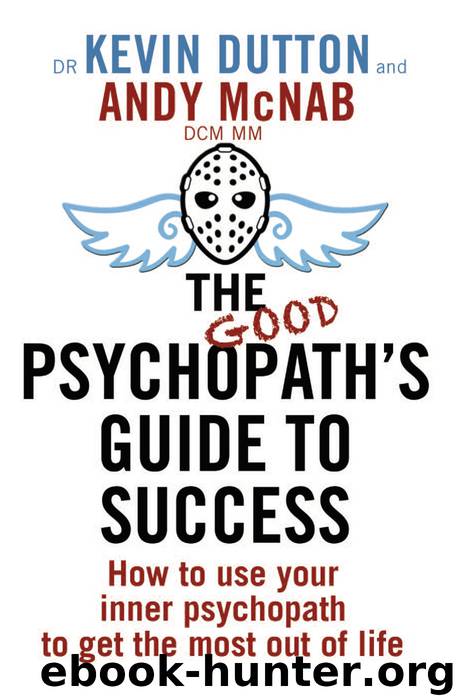The Good Psychopath's Guide to Success by Andy McNab & Kevin Dutton

Author:Andy McNab & Kevin Dutton [McNab, Andy & Dutton, Kevin]
Language: eng
Format: epub, azw3, mobi
Tags: Biography & Autobiography, General, Business, Psychology, Business & Economics, Business Communication, Self-Help
ISBN: 9780593073995
Google: unGnAgAAQBAJ
Amazon: B00HWR2I6S
Publisher: Transworld
Published: 2014-05-07T21:00:00+00:00
‘OK,’ I say. ‘On the back of this bag I’ve written out a very simple sum. Now what I’m going to do is I’m going to reveal each of the numbers one by one to you and your job is to add it up out loud as we work our way down. You got me?’
Andy looks doubtful.
‘It’d help if you put pound signs in front of them,’ he says. ‘But OK, let’s give it a go.’
‘Right,’ I say, and reveal the first number.
‘One thousand,’ says Andy.
‘You’re on a roll,’ I say, and reveal the second number.
‘One thousand and forty.’
‘Genius!’ I say, and move on to the third.
‘Two thousand and forty . . .’
A few seconds later, Andy comes up with the total:
FOUR THOUSAND ONE HUNDRED!
‘They wanted me on Countdown instead of Carol Vorderman,’ he crows. ‘But I turned ’em down. I fancied a bit more of a challenge.’
‘Some people reckon you are Carol Vorderman,’ I mutter.
‘What was that?’ he says.
‘Nothing,’ I say. ‘Anyway, I don’t believe this but you’ve actually got it right!’
Andy looks at me like one o’clock half struck.
‘What do you mean, I got it right? Of course I got it right. Why wouldn’t I?’
‘Well,’ I say, sheepishly. ‘When 99.9 per cent of people get to the penultimate calculation – 4090 + 10 – their brains instantly reach for the nicest, roundest, cuddliest whole number that they can think of. And they come up with . . . 5,000. Even Cambridge maths professors get this wrong. But you . . .?’
‘Maybe they could do with a few more psychopaths in Cambridge?’ Andy laughs.
I’m not so sure. I shove the bag back into the seat pocket and grab a glass of champagne from the cabin steward who’s doing the rounds. I feel like I’ve earned it.
‘Anyway,’ I say, taking a sip, ‘that, to answer your question, is why our brains love simplicity. You see, whenever our prehistoric ancestors faced a difficult situation – let’s say a predator, for instance – it would’ve been those who came up with the correct solution to such a predicament, be it fight or flight, that would’ve been most likely to survive and to pass on their genes to future generations. But even more likely to survive and to pass on their genes to future generations would’ve been those who came up with the correct solution most quickly.
‘Imagine, for instance, if every time you were faced with a sabre-toothed tiger you had to weigh the situation up from scratch: black, orange, stripy, fangs, drooling . . . creeping towards me slowly—’
‘What do you mean, “every time”?’ Andy butts in. ‘There wouldn’t be an “every time”. There would just be the one, mate.’
‘Exactly,’ I say. ‘Life happens way too fast for it to be any other way. So over the years, the millions of years of our evolutionary history, our brains have learned to take short cuts; to use mental rules of thumb to make decisions; to employ learned associations; to assimilate millions upon millions
Download
The Good Psychopath's Guide to Success by Andy McNab & Kevin Dutton.azw3
The Good Psychopath's Guide to Success by Andy McNab & Kevin Dutton.mobi
This site does not store any files on its server. We only index and link to content provided by other sites. Please contact the content providers to delete copyright contents if any and email us, we'll remove relevant links or contents immediately.
The Compound Effect by Darren Hardy(8949)
Tools of Titans by Timothy Ferriss(8369)
How to Be a Bawse: A Guide to Conquering Life by Lilly Singh(7472)
Deep Work by Cal Newport(7069)
Wiseguy by Nicholas Pileggi(5771)
Grit by Angela Duckworth(5609)
The Slight Edge by Jeff Olson(5410)
Discipline Equals Freedom by Jocko Willink(5381)
The Motivation Myth by Jeff Haden(5206)
The Laws of Human Nature by Robert Greene(5182)
Influence: The Psychology of Persuasion by Robert B. Cialdini(4782)
Year of Yes by Shonda Rhimes(4755)
The Miracle Morning by Hal Elrod(4716)
The Four Tendencies by Gretchen Rubin(4595)
Eat That Frog! by Brian Tracy(4526)
The Confidence Code by Katty Kay(4252)
Hyperfocus by Chris Bailey(4112)
Visual Intelligence by Amy E. Herman(3778)
The Inner Game of Tennis by W. Timothy Gallwey(3682)
